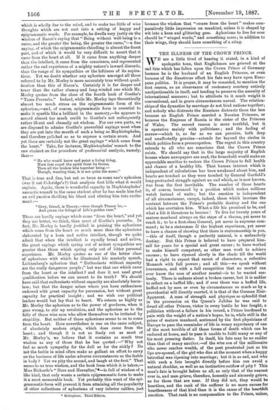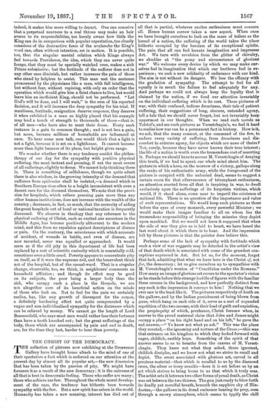THE ILLNESS OF THE CROWN PRINCE.
WE are a little tired of hearing it stated, in a kind of apologetic tone, that Englishmen are grieved at the sad fate which has fallen upon the Crown Prince of Germany because he is the husband of an English Princess, or even because of the disastrous effect his fate may have upon Euro- pean politics. It is proper, it may be conceded, to mention the first reason, as an observance of customary courtesy entirely unobjectionable in itself, and tending to preserve the amenity of international manners ; but to attribute to it much weight is conventional, and in grave circumstances unreal. The relation- ships of the dynasties by marriage do not bind nations together; and nobody who distrusts the Russians distrusts them the less because an English Prince married a Russian Princess, or because the Empress of Russia is the sister of the Princess of Wales. The second reason is more truthful, but it is operative mainly with politicians ; and the feeling of sorrow—which is, so far as we can perceive, both deep and unaffectedly genuine—extends far beyond the circles in which politics form a preoccupation. The regret in this country extends to all who are conscious that the Crown Prince exists. We should say that in the large majority of English houses where newspapers are read, the household would make an appreciable sacrifice to restore the Crown Prince to full health and chance of a healthy life. That human interest which is independent of calculations has been awakened about him, and hearts are touched as they were touched by General Garfield's long-protracted struggle against an end which, as is now known, was from the first inevitable. The number of those hearts is, of course, increased by a position which makes millions watch instead of units ; but the emotion is independent of all circumstances, except, indeed, those which increase the contrast between the Prince's probable destiny and the one which has overtaken him. What a life his promised to be, and what a life it threatens to become ! To live for twenty years of mature manhood always on the steps of a throne, yet never to reach it ; to be a first-class General, yet never in supreme com- mand; to be a statesman of the highest experience, yet never to have a chance of showing that there is statesmanship in you, —this of itself, though a perfectly natural, is a melancholy destiny. But this Prince ie believed to have prepared him- self for years for a special and great career ; to have worked to make himself competent, as other men work to achieve success ; to have ripened slowly in the shade till the world bad a right to expect that rarest of characters, a reflective Monarch with full powers ; and all this—we speak without irreverence, and with a full recognition that no mortal can ever know the uses of another mortal—is to be wasted use- lessly. There is sadness about a broken career, but it is sadder to reflect on a baffled life ; and if ever there was a baffled life, baffled not by men or even by circumstances so much as by a providential will directly exerted, it is that of the German Heir- Apparent. A man of strength and physique so splendid that in the procession on the Queen's Jubilee he was said to dwarf all other Princes, victor in every battle he has fought, a politician without a failure in his record, a Prince burdened to pain with the weight of a nation's hopes, he is, while still in the prime of mature manhood, sentenced by the first physicians of Europe to pass the remainder of life in weary expectancy of one of the most terrible of all those forms of death which can be endured at home, and to pass it unable to fulfil many or any of his most pressing duties. In itself, his fate may be no sadder than that of many another,—of the wise son of the millionaire who never reaches wealth, of the poet prostrated just as his lips are opened, of the girl who dies at the moment when a happy betrothal was ripening into marriage; but it is as sad, and who with such a fate brought directly before him can avoid a natural shudder, as well as an instinctive outflow of pity ? This man's fate is brought before us all, as only that of the nearest ever is, and men grieve, therefore, honestly and sincerely grieve, as for those that are near. If they did not, they would be heartless, and the rank of the sufferer is no more excuse for heartlessness of that kind than it is the cause of the heartfelt emotion. That rank is no compensation to the Prince, unless,
indeed, it makes him more willing to depart. One can conceive that a perpetual nearness to a real throne may make an heir averse to its responsibilities, too keenly aware how little the King can do in comparison with popular expectation, too clearly conscious of the destructive force of the avalanche the King's word can, often without intention, set in motion. It is possible, too, that the singular mental relation which Kings always feel towards Providence, the idea, which they can never quite forego, that they must be specially watched over, makes a sick Prince submissive ; but the fortitude of the sufferer does not in any other case diminish, but rather increases the pain of those who stand by helpless to assist. This man met the sentence pronounced by the physicians like a man, with full intelligence, but without fear, without repining, with only an order that the operation which would give him a faint chance to live, but would leave him an inefficient King, should not be performed. "Let God's will be done, and I will wait," is the sum of his reported decision, and A will increase the deep sympathy for his triaL If manliness, fortitude, resignation deserve response, they deserve it when exhibited in a man so highly placed that his example may lend a touch of strength to thousands of those—that is, of all men—who have also to meet their doom. Every such instance is a gain to common thought ; and is not less a gain, but more, because millions of households are influenced at once. To bear some men talk, one would think that a light is not a light, because it is set on a lighthouse. It cannot become more than light bemuse of its place, but height gives range.
We wonder whether there is any tendency amidst the philan- thropy of our day for the sympathy with positive physical suffering. the most instant and pressing, if not the most severe of all sufferings, slightly to decay. We cannot help thinking there is. There is something of selfishness, though we quite admit there is also wisdom, in the growing intensity of the demand that sufferers from epidemics shall be isolated,—a demand which in Southern Europe rises often to a height inconsistent with even a decent care for the diseased themselves. We note that the provi- sion for hospitals, which relieve pressing pain more than any other human institutions, does not increase with the wealth of the country ; decreases, in fact, so much, that the necessity of aiding the great hospitals out of local or national taxation is frequently discussed. We observe in theology that any reference to the physical suffering of Christ, such as excited our ancestors in the Middle Ages, has become positively abhorrent to the modern mind, and this from no repulsion against descriptions of disease or pain. On the contrary, the minuteness with which accounts of accident, of wounds in battle, and even of disease, are now recorded, never was equalled or approached. It would seem as if the old pity in this department of life bad been replaced by a sort of scientific cariosity which is essentially cold, sometimes even a little cruel. Poverty appears to concentrate pity on itself, as if it were the supreme evil, and the benevolent think not of the hospital, but of the casual-ward. That is a singular change, observable, too, we think, in neighbours' comments on household affliction ; and though its effect may be good on its subjects, the poor being a larger body than the sick, who occupy such a place in the Gospels, we are not altogether sure of its beneficial action on the minds of those who look on. Not to feel for the pain we certainly realise, has, like any growth of disrespect for the corpse, a definitely hardening effect not quite compensated by a vague and non-individualised sympathy for the distresses which can be relieved by money. We cannot go the length of Lord Beaconsfield, who says most men would rather lose their fortunes than have a tooth knocked out; but the great sufferings of the body, those which are accompanied by pain and end in death, are, for the time they last, harder to bear than poverty.
























































 Previous page
Previous page